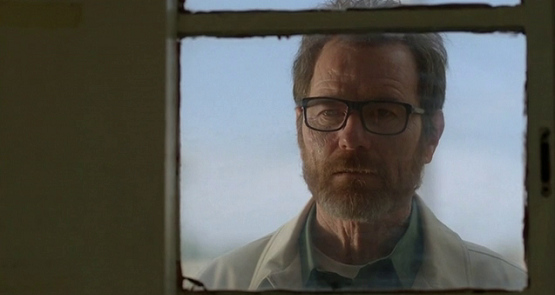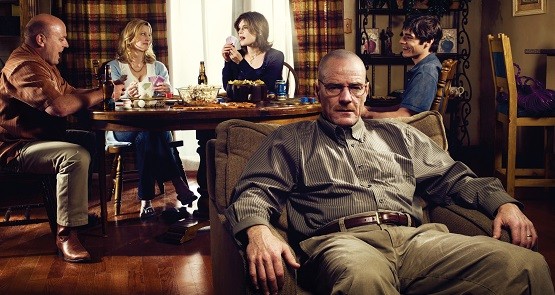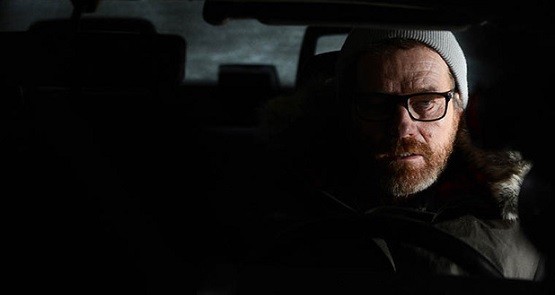
For 5 seasons, Breaking Bad was something of a perpetual motion machine. Beginning with the almost innocuous premise of a beleaguered chemistry teacher turning to a life of crime, it quickly spun out into a cyclical, sickening morality tale. Touted far and wide as one of the greatest television series ever made, many see the last episode as some kind of stamp, the supposed seal on the envelope admitting it to the “pantheon”, as it’s so-called. Audiences and critics had already decided what Breaking Bad was; the show just had to decide how to be it.
It couldn’t have been the series finale of Breaking Bad without Walter White coughing. In the last cold open the show will ever give us, Walt enters an unlocked, snow-clad car and searches for the keys. He pries away with a screwdriver from the glovebox (not before we see the all-important Marty Robbins cassette he uses to blow up the DEA — kidding) but can’t get the car to start. His warm breath is visible, as though we’re literally seeing the last remnants of his soul.
The red and blue flash of a police car illuminates him from behind. The forces of good which had evaded him so long — which he had so strenuously operated outside of since he began to cook crystal meth — had finally caught him. But as he whispers, “Just get me home. I’ll do the rest,” the officer’s torchlight vanishes and the red and blue lights recede, reflected in the lenses of his glasses. Was Walt praying? Was he speaking to a universal god? Or just to his own — Heisenberg?
As he realises the keys hide overhead and frees the car window of snow with one slick hit, it becomes clear exactly who. Walt has spent most of the series worshipping at the altar of this godlike figure he created and subsequently inhabited. He became the one who knocks, he became the danger. He became a bumbling, scattered, blue angel of death. So how do you bring death’s journey to a satisfying end?

Structurally, Breaking Bad’s best moments are never the most action-packed. Sure, the climactic scene at Todd’s White Supremacist Funland is thrilling and ‘badass’ in that warped Walter White way we’ve all come to enjoy. But looking back, when was the show ever more chillingly magnetic than the camera slowly panning over the Lily of the Valley, the anarchic buzzing of the fly in Gus Fring’s meth lab, the perfectly silent death of Mike Ehrmantraut?
For these reasons, this finale feels as neat as it needed to be. Breaking Bad works within certain parameters. The pilot showed us Walt as his most innocent, and “Ozymandias” showed him at his most despicably evil. The flash-forward sequence that pre-empted the fifth season’s premiere — Walt’s birthday, the retrieval of the ricin, the machine gun in the trunk — showed us all the tools and then, across the next fifteen episodes, demonstrated how they would be put together. Where its network-mate Mad Men is beguiling and elegant, Breaking Bad tended more towards blunt and confronting.
In this sense this finale felt somewhat instructive but simultaneously like the show filling in the blanks and leaving it at that. That’s not to say that Walt’s laser pointer-aided home invasion wasn’t thrilling, or that the slow reveal of Walt’s presence during the phone call between Skyler and Marie wasn’t deeply unsettling. But therein lay the problem the show created for itself. It became so obsessed with Walter White that all else became sundry.
It’s a finale that creates any number of questions, to a point. Jesse is free of meth slavery — but what then? A man who had spent the last couple of years of his life either manipulated by a mentor who crafted his own form of bondage or in the ethereal grasp of drug-addled stupor was able to drive away, but there’s so little guarantee of his well-being. His wife takes a phone call from his sister-in-law whose husband’s corpse can now be unearthed thanks to Walt’s coded lottery ticket. Flynn returns home to a chain-smoking Skyler in their new, dimly-lit apartment while baby Holly sleeps upstairs.
It seems all too telling that all of these moments came before the final scene. Walt lies dead — spared by Jesse — but felled by his own bullet in the middle of a meth lab that could only exist if he did. Badfinger’s “Baby Blue” plays, and that’s it. That’s the show. Walt tied up the loose ends he had left dangling, hoping for some kind of redemption. But after the events of “Ozymandias”, how on earth could he possibly deserve such a thing?

And yet, it still feels like a satisfying end to a series which was content to wrestle with the identity of its anti-heroic protagonist and not much more. There’s little wider evocation of the effects of Walt’s drug empire; it’s mostly focused on the devastating spiral of evil and how it both draws in and repels all around him. Many predicted that Holly would prove the ultimate casualty of Walter White’s transgressions, but evidently Vince Gilligan was more interested in returning a sliver of his humanity. For a show that always tended to be a little simplistic, it’s certainly an appropriate ending.
Many have argued that “Ozymandias” was the logical end-point for the series, and in many ways I agree. But Breaking Bad is a show that has provoked a massive range of reactions, and oftentimes it feels as though we as the audience have our own position on the spectrum from “rooting for Walt” to “wishing for Walt’s brutal death”. It’s very unclear whether or not escaping from Walter White, crushed and alone at his lowest of lows, would be as emotionally fulfilling as it would be morally satisfying. At the very least, Walt finally admits to the extreme selfishness of his actions.
In dragging Walt back from the brink, Gilligan has either affirmed the idea that essential humanity can still seep through after breaking bad, or admitted that we were meant to be cheering Walt on for his demonic behaviour all along. Neither quite sits comfortably with me on a thematic level, but as a narrative, this feels like the only way it could realistically end within the boundaries it set for itself. Those boundaries may be what hold this episode back from true brilliance, but there’s no denying the series’ mastery of its territory.
It’s much too early and facile to talk of Breaking Bad’s status in relation to the classic television that’s come before it (though that certainly isn’t stopping many). The thing about a series finale is that it’s an end as much as it is a continuation; while the story meets an end like Walt’s, the show’s legacy — fettered as it now is by narrative closure — and the ongoing question of its impact on the televisual landscape will shuffle on. With time it will be freed and evaluated from a distance. But for now, “Felina” eases our thudding hearts and calms the nerves previous episodes so wonderfully jangled. Goodbye, Breaking Bad, and thank you for the ride.







Crikey is committed to hosting lively discussions. Help us keep the conversation useful, interesting and welcoming. We aim to publish comments quickly in the interest of promoting robust conversation, but we’re a small team and we deploy filters to protect against legal risk. Occasionally your comment may be held up while we review, but we’re working as fast as we can to keep the conversation rolling.
The Crikey comment section is members-only content. Please subscribe to leave a comment.
The Crikey comment section is members-only content. Please login to leave a comment.